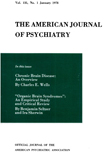Animal-human correlates of narcotic dependence: a brief review
Abstract
Knowledge of opiate action in laboratory animals can be of great value in developing a rational clinical approach to the treatment of narcotic dependence. Physiological alterations experimentally produced by narcotics have been confirmed in human subjects, and classical laboratory effects of conditioning and operant behavior also have clinical counterparts. Realization of animal-human correlates of narcotic dependence allows a better understanding of the strengths and weaknesses of existing therapeutic modalities.
Access content
To read the fulltext, please use one of the options below to sign in or purchase access.- Personal login
- Institutional Login
- Sign in via OpenAthens
- Register for access
-
Please login/register if you wish to pair your device and check access availability.
Not a subscriber?
PsychiatryOnline subscription options offer access to the DSM-5 library, books, journals, CME, and patient resources. This all-in-one virtual library provides psychiatrists and mental health professionals with key resources for diagnosis, treatment, research, and professional development.
Need more help? PsychiatryOnline Customer Service may be reached by emailing [email protected] or by calling 800-368-5777 (in the U.S.) or 703-907-7322 (outside the U.S.).



